Nurture Group
Purpose of Nurture
Nurture provision offers a short term, focused, early intervention strategy, which addresses barriers to earning arising primarily from social, behaviour, emotional or well-being difficulties, in an inclusive and supportive manner. Central to the philosophy of nurture is the theory of attachment, and thee need for a cold to be able to form secure and happy relationships with others in thee formative years of their lives. The nurture group provides an opportunity for a child to revisit early nurturing experiences.
The Six Principles
At Norbury Manor Primary School we believe that our Nurture provision should be guided by the following six principles:
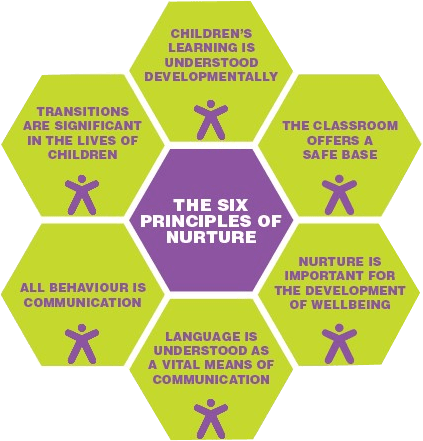
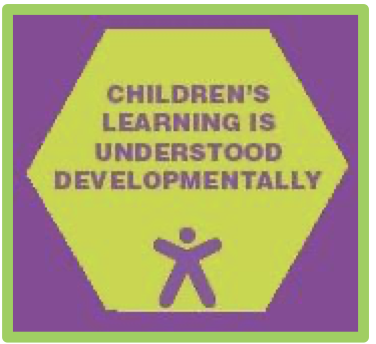
Children's Learning is understood Developmentally
In our nurture provision staff respond to students not in terms of only expectations about ‘attainment levels' but in terms of the children's developmental progress assessed through individualised targets and a real understanding of the needs they have to support their learning and ensure ‘catch up’ in all areas of their development.
The response to the individual student is ‘as they are', underpinned by a non-judgemental and accepting attitude.

The Classroom offers a Safe Base
The organisation of the environment and the way a senior school group is managed can contain anxiety and stress for many students.
The nurture group room offers a balance of educational and social and emotional experiences aimed at supporting the development of the student's relationship with each other and with the staff.
The nurture group is organised around a structured timetable with predictable routines. Great attention is paid to detail; the adults are reliable and consistent in their approach to the students. Our Nurture group is an educational provision making the important link between emotional containment and cognitive learning for many of the students.
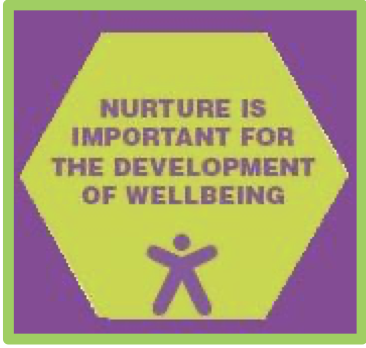
Nurture is important for the Development of Self-Esteem
Nurture involves listening and responding. In our nurture group ‘everything is verbalised' with an emphasis on the adults engaging with the children in reciprocal shared activities through the personalised attention and activities they are able to provide to them.
Students respond to being valued and thought about as individuals, so in practice this involves noticing and praising small achievements; ‘nothing is hurried in our nurture group and every achievement is recognised and valued.’
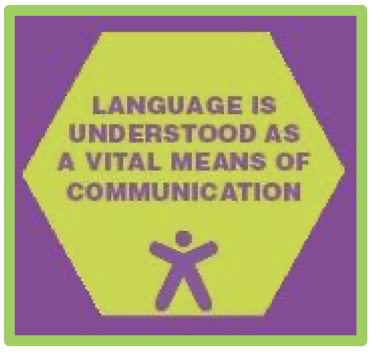
Language is Understood as a Vital Means of Communication
Language is more than a skill to be learnt, it is the way of putting feelings, beliefs, ideas, understanding and aspiration into words.
Nurture group students often ‘act out' their feelings as they lack the vocabulary to ‘name' how they feel. In our nurture groups the planned, informal opportunities for talking and sharing are as important as the more formal lessons teaching language skills.
Words are used instead of actions to express feelings and opportunities are created for extended conversations or encouraging creative thinking and doing to develop and embed understanding.
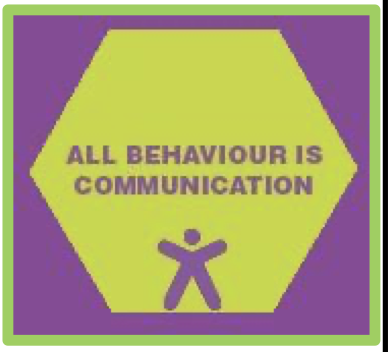
All Behaviour is Communication
This principle underlies the adult response to the student's often challenging or uncompliant behaviour. ‘Given what I know about this student and their development what is this student trying to tell me?'
We believe understanding what a student is communicating through behaviour helps staff to respond in a firm but non-punitive way by not being provoked or discouraged.
A student understanding that their feelings are understood can help to diffuse difficult situations. The adult makes the link between the external/internal worlds of the young person.
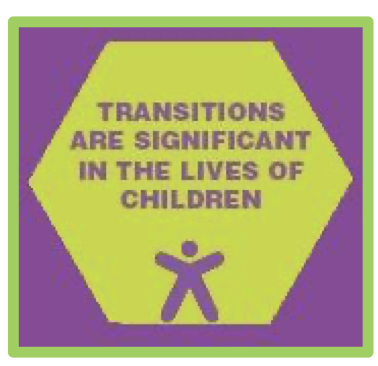
Transitions are Significant in the Lives of Students
The nurture provision helps the student make the difficult transition from home to school and from Primary to Secondary education. However, on a daily basis there are numerous transitions the student makes, e.g. between sessions and classes and between different adults. Changes in routine are invariably difficult for vulnerable students and need to be carefully managed with preparation and support.
The Nurture provision at Norbury Manor Primary School has the over-arching aim of enabling students to catch up to be secondary ready in all areas. This means they can access a senior style curriculum and level of learning and that they are emotionally ready to move into the mainstream senior school provision.
If this is not possible, due to more complex SERD need, then the aim is to support the students as fully as possible to be ready to enter the next stage of their education at Norbury Manor Primary School or other settings.
NMP Nurture Environment
The nurture room provides a secure, safe base for learning both indoors and outdoors. The environment reflects Nurture principles and those of the Communication Friendly Spaces programme.
-
NMP nurture group is based in a room within the school with a home-like area and an area set aside for formal learning.
-
The nurture groups room has the ambience of a supportive 'home'
-
The home area is furnished with, for example, a sofa, cushions, armchairs and a carpet. There are kitchen facilities with access to hot and cold water, a cooker and simple cooking equipment.
-
There is play materials as well as educational equipment for more formal work.
There is access to aa washroom and toilet facilities.
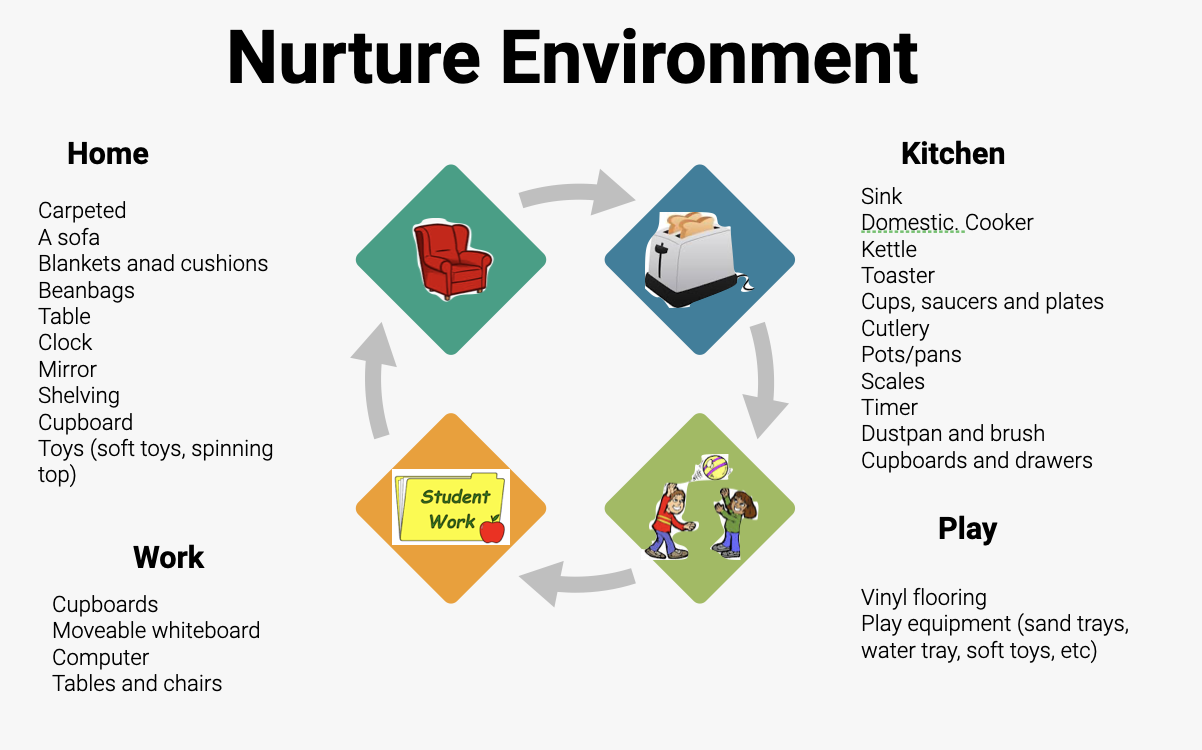
Teaching and Learning
The Nurture group have their own learning pathway which is linked to the whole school thematic curriculum with a large emphasis on PSHE, Social and Emotional learning. Activities are planned to provide stimulating and fun environment for children. Planning plots our pupil areas for development based on Boxall Profile Data. Weekly planning demonstrates key activities to support these areas for development. This is undertaken by the Nurture group team, with planning easily accessed on the school intranet system for relevant staff.
Each afternoon follows a similar pattern divided into 6 parts
Welcome and circle time
A calming where children are given the opportunity to record their current emotions on entry to the room, share news and develop listening and speaking skills.
Story time
This is time to share a story, for example a Social Story, to support the development and explicit teaching of key social skills. Questioning and conversations will link to personal experiences, feelings and reflection.
Task 1
The trained adult leads a group (based on Boxall Medium Term Planning Tool and Nurturing Success lesson plans) supporting children developing skills to meet their targets. The second trained adult supports and observes remaining children and make observation notes as needed.
Task 2
The trained adult leads a group (based on Boxall Medium Term Planning Tool and Nurturing Success lesson plans) supporting children developing skills to meet their targets. The second trained adult supports and observes remaining children and make observation notes as needed.
Snack Time
This part of the session aims to provide opportunities to socialise with peers in an adult setting. Children take responsibility for tasks relating to serving drinks and snacks.
Celebration Time
This is time for reflection, praise and celebration. Children have an opportunity to identify and praise other children in the group. Where necessary, adults to intervene to develop and support skills, confidence and self-esteem.
Children return to class in preparation for home time. Children attend 3 sessions a week.
Identification and Referral
The nurture group currently supports a range of children from Year 1 - Year 6. The identification and review process takes place on an ongoing basis.
Raising Concerns
Staff raise awareness of current pupils issues with SENCO, during pupil progress meetings or with their phase leader.
Boxall Profiles
All children are screened using the Boxall Profile. The is a series of questions covering various aspects of a child's social and emotional development. It provides a clear and personalised picture of a child's area of need. The results are discussed during pupil progress meetings.
From the Boxall profiles, a report will be created where children are selected for the group according to need. This grouping can be flexible to include other children in some of the sessions. Children will leave and join the group as progress is made.
Assessment
Your Nurture groups assess learning and social and emotional needs and give the necessary help to remove the barriers to learning. There is great emphasis on language development and communication. Nothing is taken for granted and everything is explained. Supported by role modelling, demonstration and the use of gesture as appropriate. The relationship between two staff, always nurturing and supportive , provides a role model that children observe and begin to copy. Food is shared at 'breakfast' or 'snack time' with many opportunities for social learning, helping children to attend to the needs of others, with time to listen and to be listened to.
The Boxall profile (which allows for an individual picture of the child's social and emotional needs) is used as the assessment tool. This is carried out in line with the school assessment system in order for staff to be aware of any progress or change in the areas of needs to be developed.
Students in the Nurture group also follow the normal school assessment and monitoring system. In English and Maths, students either work in small HLTA groups and follow a bespoke curriculum or are part of their class English and Maths lessons.
Reintegration
The most effective length of time to be a member of the nurture group is 2-4 terms. At any time throughout this, depending on the progress of the child, a re-integrating programme may begin.
The re-integration process is fully supported by nurture group staff, the pupil, class teacher and parents.